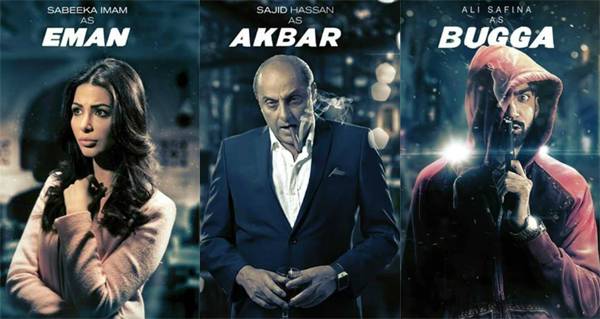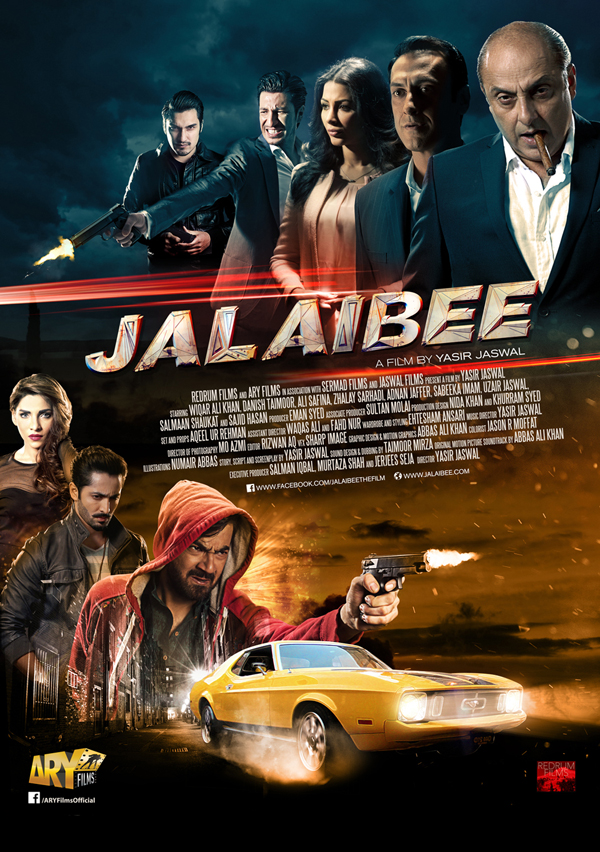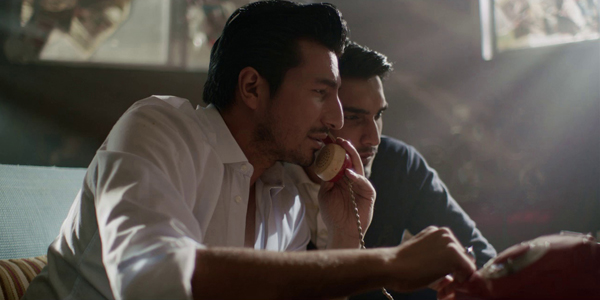
Movies like Jalaibee work well when they do not take themselves too seriously – and fail spectacularly when they do. Such films need to narrate their story of the crimes perpetrated by the principal characters without being interested in the prevention and solution of the crimes, and with elements of comedy, humour, wit, cunning, and surprise. The trick is to tell the story with absolute seriousness while being aware of its implausibility, nerve, and audacity. This inside joke of the caper thriller is lost on everyone but actor Ali Safina in Yasir Jaswal’s handsome but bland film Jalaibee, which takes itself far too seriously to be any fun.
The movie, it must be said, looks very good. Mo Azmi’s wonderful cinematography, Khurram Syed’s largely original sets, Ehtesham Ansari’s bright costumes, and Nida Khan and Khurram Syed’s stylish production design make Jalaibee a visual treat. Jaswal certainly has an eye for the splendid and the picturesque. Pictorial splendour, in the absence of a good story, interesting characters, and essential elements of the genre, however, gets old and tiresome very quickly. This is where Jalaibee fails miserably: Jaswal seems to pay attention only to visual style and little else.

The title of the film alludes to an intricate plot with twists and turns and a complex, labyrinthine narrative. The jalaibee is a delicate confection, the preparation of which requires finesse, expertise, and ease. When effort needs to be expended in creating a jalaibee, the result is a mess, devoid of beauty; a mess that, albeit tasty, is never served and always discarded. Jaswal tries to create a complicated plot that is layered, clever, and funny but does so without panache and with far too much effort. His desperation to create a Tarantino-esque plot ends up with a mess of a story that one wishes he had discarded. That Jaswal is a talented filmmaker cannot be taken away from him, but he is not a writer. He needs to leave the job of writing to those who are good at it.
Jalaibee is the story of two childhood friends, Billu (Danish Taimoor) and Bugga (Ali Safina), caught up in a dangerous situation: they need to come up with a sum of fifty million rupees within a couple of days. The two plan to steal this huge sum from the villainous Khan (Raja Ajaz), who funnels the entire city’s gambling proceeds each night, but lives alone with virtually no security. The two men end up stealing a car with an unconscious top politician, Akbar (Sajid Hasan), in the trunk. They owe the money, coincidentally, to the politician’s closest confidante, Dara (Adnan Jaffer). A parallel story features brothers Ali (Wiqar Ali Khan) and Jimmy (Waqar Jaswal) who both have an intense hatred for the politician. They had kidnapped Akbar using the car now stolen by Billu and Bugga.
Through a series of forced coincidences and connections – but no twists and turns – all the players end up in a warehouse where everyone but Billu and Bugga end up dead. The two friends get to walk away with all the money that had been stolen from Khan’s home. The big surprise is supposed to come in the form of a woman who arrives – far too long after the climax – to kill Billu and set the loot on fire in a hotel with no smoke alarms or sprinklers. Her carefully veiled identity, sadly, is no surprise, given that all but one of the characters in the film have been killed off by now. She couldn’t possibly have been anyone else.

Jalaibee does not take the time to examine the dynamics of what could have been interesting relationships. The film is far too busy being stylish to pay attention to the relationships between Billu and Bugga, Ali and Jimmy, Eman (Sabeeka Imam) and Akbar, and Ali and Bunno (Zhalay Sarhadi). This does the cast a disservice by taking away from them any real opportunity to act in a film with a particularly tepid story. How one wishes that Jaswal had taken the time to create relationships reminiscent of those between Vincent (John Travolta) and Jules (Samuel L. Jackson) in Pulp Fiction and Jackie (Pam Grier) and Max (Robert Forster) in Jackie Brown!
The dialogue, too, leaves much to be desired. Other than one poignant conversation between Bugga and Bannu, as they wait for Khan in the stolen car, the dialogue is mostly banal, often stilted, and remarkably superficial. Inexplicably and far too often, Jaswal intercuts between scenes that take place simultaneously, but without any underlying intertextuality and without any necessity created by non-linearity in the screenplay. The device has no payoff. Good dialogue is needed to raise the crime caper to the level of a classic. The smart dialogue in the diner scene at the end of Pulp Fiction, when Jules’ elaborate but silly moral disclosure forces the audience to question his characterization as a conventional thug, creates sheer cinematic magic. That kind of magic is needed but sorely missing in Jalaibee.
Music, however, is one of the film’s strengths. Original and creative, Abbas Ali Khan’s background score adds to the mood of the film. It may well be one of the best scores written for a Pakistani film in years. Jalaibee uses nine songs – some better than others – very effectively as background music. The use of Munni Begum’s “Jhoom Barabar Jhoom” in the rickshaw scene with Billu and Bugga is masterful. The song is later reprised as a poorly sung, but effectively used, cover during an action sequence. The finest song in the film is the charming number “Jawani” thanks to its lilting tune and brilliant orchestration. The song is used for an item number choreographed by the talented Wahab Shah and performed by the lovely Zhalay Sarhadi. Filmed with assurance and edited with confidence, “Jawani”, unlike Bollywood item numbers, is understated and graceful. Sarhadi not only dances with elegance and grace, but also does so without demeaning herself by showing too much skin and being vulgar. Class and titillation need not be mutually exclusive.
The performances in Jalaibee are mostly weak. The actors seem focused on maintaining horribly false accents and looking good rather than on performing well, whereas the director appears disinterested in eliciting good performances from his cast, some of who appear to have real talent. Adnan Jaffer does well, as does Zhalay Sarhadi who has some strong moments in the film. The talented Salmaan Ahmed Shaukat plays the difficult role of an honest security guard in a dishonest world remarkably well but is given very little screen time.
The worst performances come from Sabeeka Imam and veteran actor Sajid Hasan. The two seem disinterested not only in their characters but also in the film itself. They ruin a confrontational scene between father and daughter by not making even the slightest effort to perform seriously and generate the requisite emotions. Ali Safina is the only actor who performs well consistently through the movie. The winsome young actor seems to inhabit the clever film that Jalaibee could have been – and not the pretentious one it is. The two women actors in the film look very good and, in a few scenes, are positively ravishing, but they lack soul, competence, and mystery. The same is true of Jalaibee.
Ally Adnan lives in Dallas and writes on culture, history, and the arts. He tweets @allyadnan.
The movie, it must be said, looks very good. Mo Azmi’s wonderful cinematography, Khurram Syed’s largely original sets, Ehtesham Ansari’s bright costumes, and Nida Khan and Khurram Syed’s stylish production design make Jalaibee a visual treat. Jaswal certainly has an eye for the splendid and the picturesque. Pictorial splendour, in the absence of a good story, interesting characters, and essential elements of the genre, however, gets old and tiresome very quickly. This is where Jalaibee fails miserably: Jaswal seems to pay attention only to visual style and little else.

The title of the film alludes to an intricate plot with twists and turns and a complex, labyrinthine narrative. The jalaibee is a delicate confection, the preparation of which requires finesse, expertise, and ease. When effort needs to be expended in creating a jalaibee, the result is a mess, devoid of beauty; a mess that, albeit tasty, is never served and always discarded. Jaswal tries to create a complicated plot that is layered, clever, and funny but does so without panache and with far too much effort. His desperation to create a Tarantino-esque plot ends up with a mess of a story that one wishes he had discarded. That Jaswal is a talented filmmaker cannot be taken away from him, but he is not a writer. He needs to leave the job of writing to those who are good at it.
Jaswal tries to create a complicated plot that is layered, clever, and funny but does so without panache and with far too much effort.
Jalaibee is the story of two childhood friends, Billu (Danish Taimoor) and Bugga (Ali Safina), caught up in a dangerous situation: they need to come up with a sum of fifty million rupees within a couple of days. The two plan to steal this huge sum from the villainous Khan (Raja Ajaz), who funnels the entire city’s gambling proceeds each night, but lives alone with virtually no security. The two men end up stealing a car with an unconscious top politician, Akbar (Sajid Hasan), in the trunk. They owe the money, coincidentally, to the politician’s closest confidante, Dara (Adnan Jaffer). A parallel story features brothers Ali (Wiqar Ali Khan) and Jimmy (Waqar Jaswal) who both have an intense hatred for the politician. They had kidnapped Akbar using the car now stolen by Billu and Bugga.
Through a series of forced coincidences and connections – but no twists and turns – all the players end up in a warehouse where everyone but Billu and Bugga end up dead. The two friends get to walk away with all the money that had been stolen from Khan’s home. The big surprise is supposed to come in the form of a woman who arrives – far too long after the climax – to kill Billu and set the loot on fire in a hotel with no smoke alarms or sprinklers. Her carefully veiled identity, sadly, is no surprise, given that all but one of the characters in the film have been killed off by now. She couldn’t possibly have been anyone else.

Jalaibee does not take the time to examine the dynamics of what could have been interesting relationships. The film is far too busy being stylish to pay attention to the relationships between Billu and Bugga, Ali and Jimmy, Eman (Sabeeka Imam) and Akbar, and Ali and Bunno (Zhalay Sarhadi). This does the cast a disservice by taking away from them any real opportunity to act in a film with a particularly tepid story. How one wishes that Jaswal had taken the time to create relationships reminiscent of those between Vincent (John Travolta) and Jules (Samuel L. Jackson) in Pulp Fiction and Jackie (Pam Grier) and Max (Robert Forster) in Jackie Brown!
The dialogue, too, leaves much to be desired. Other than one poignant conversation between Bugga and Bannu, as they wait for Khan in the stolen car, the dialogue is mostly banal, often stilted, and remarkably superficial. Inexplicably and far too often, Jaswal intercuts between scenes that take place simultaneously, but without any underlying intertextuality and without any necessity created by non-linearity in the screenplay. The device has no payoff. Good dialogue is needed to raise the crime caper to the level of a classic. The smart dialogue in the diner scene at the end of Pulp Fiction, when Jules’ elaborate but silly moral disclosure forces the audience to question his characterization as a conventional thug, creates sheer cinematic magic. That kind of magic is needed but sorely missing in Jalaibee.
Music, however, is one of the film’s strengths. Original and creative, Abbas Ali Khan’s background score adds to the mood of the film. It may well be one of the best scores written for a Pakistani film in years. Jalaibee uses nine songs – some better than others – very effectively as background music. The use of Munni Begum’s “Jhoom Barabar Jhoom” in the rickshaw scene with Billu and Bugga is masterful. The song is later reprised as a poorly sung, but effectively used, cover during an action sequence. The finest song in the film is the charming number “Jawani” thanks to its lilting tune and brilliant orchestration. The song is used for an item number choreographed by the talented Wahab Shah and performed by the lovely Zhalay Sarhadi. Filmed with assurance and edited with confidence, “Jawani”, unlike Bollywood item numbers, is understated and graceful. Sarhadi not only dances with elegance and grace, but also does so without demeaning herself by showing too much skin and being vulgar. Class and titillation need not be mutually exclusive.
The performances in Jalaibee are mostly weak. The actors seem focused on maintaining horribly false accents and looking good rather than on performing well, whereas the director appears disinterested in eliciting good performances from his cast, some of who appear to have real talent. Adnan Jaffer does well, as does Zhalay Sarhadi who has some strong moments in the film. The talented Salmaan Ahmed Shaukat plays the difficult role of an honest security guard in a dishonest world remarkably well but is given very little screen time.
The worst performances come from Sabeeka Imam and veteran actor Sajid Hasan. The two seem disinterested not only in their characters but also in the film itself. They ruin a confrontational scene between father and daughter by not making even the slightest effort to perform seriously and generate the requisite emotions. Ali Safina is the only actor who performs well consistently through the movie. The winsome young actor seems to inhabit the clever film that Jalaibee could have been – and not the pretentious one it is. The two women actors in the film look very good and, in a few scenes, are positively ravishing, but they lack soul, competence, and mystery. The same is true of Jalaibee.
Ally Adnan lives in Dallas and writes on culture, history, and the arts. He tweets @allyadnan.

